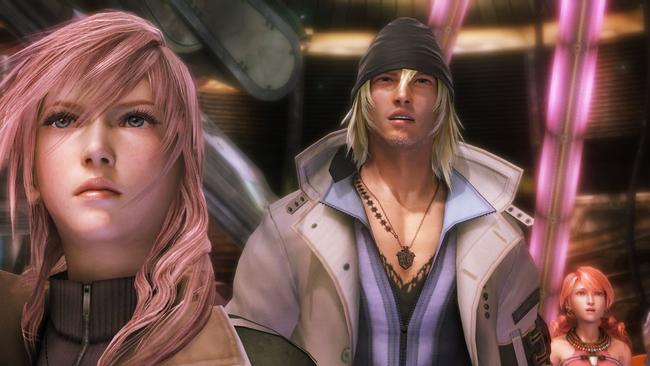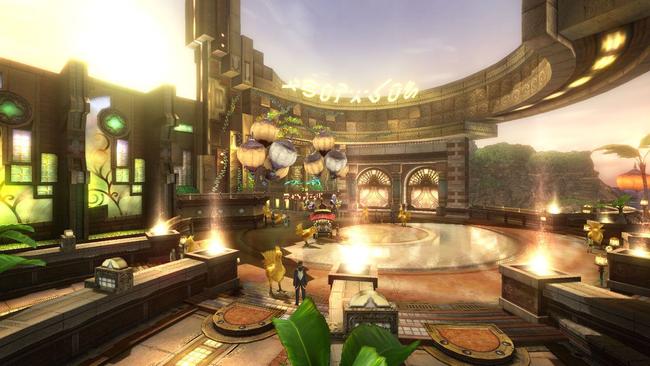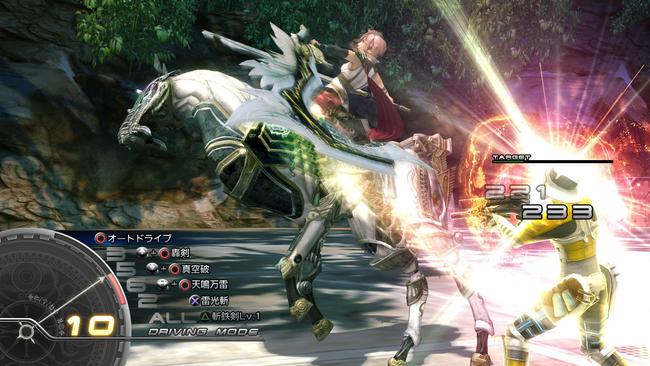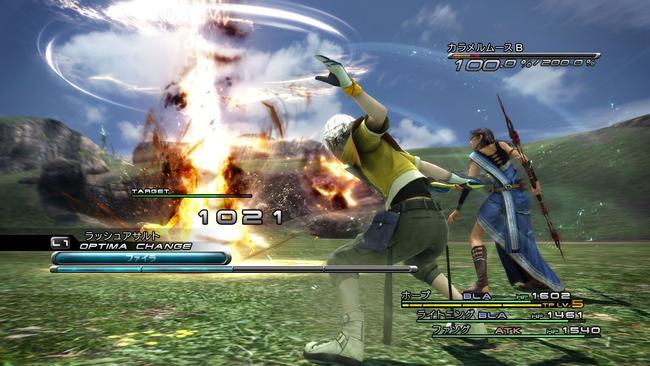Final Fantasy XIII: Built for the West
After spending some sixty hours with the game, the influence of the West on Final Fantasy XIII is undeniable.
While it may seem like many moons ago, the smash-hit success of Final Fantasy VII is still fresh to Square Enix, and what truly sets that game apart from the rest of the series is incredibly strong performance in the West.
With the Japanese video game market contracting and shifting focus to handheld machines, the place for big-budget, spectacle RPGs like those in the main-line Final Fantasy series is debatable and so Square have tried to remedy this by giving FF13 a decidedly Western flavor in order to attract gamers who usually wouldn't touch a slow, turn based RPG.
It's an interesting change of focus, as for all its success Final Fantasy VII was also a slow, turn-based RPG that the many casual gamers would usually snub - so why was it so successful?

Some might credit the success to Sony's aggressive advertising campaign for the game, which claimed those who made cartridge games might end up committing suicide. Some might also credit it to being in the right place at the right time, on Sony's rising star, the PS1.
I'd say that both those things played a very important role in the success of Final Fantasy VII, but there's something else I'd credit more than either of those things: its cinematic values.
The cinematic, dramatic presentation of Final Fantasy VII in the form of its CGI cutscenes helped propel that game from being a smaller title from Japan to being the most incredible thing many gamers had ever seen.
In a world barely out of the 2D age, FF7 was the most incredible, visceral storytelling ever seen in a videogame, and Sony's adverts - boasting about 40 minutes of CGI cutscenes and a movie like experience - did their best to convey this to the players.
People flocked to the game interested in the epic story and in the process many people who usually would've snubbed a turn-based game ended up picking up FF7, cementing it as an all-time classic.
The gameplay of Final Fantasy was niche then, and for a while the series' success rode more on its reputation for outlandish, impressive graphics and cutscenes and a lengthy, detailed story than it did on the gameplay. Even as Final Fantasy X released in 2001, marketing was focused on the addition of voice acting and facial animation rather than the new, faster, better battle mechanics.
Some of the people drawn into Final Fantasy by the presentation loved the gameplay and became RPG converts, but many of them would tire of the gameplay and later find their movie-style gaming fix in titles like Metal Gear Solid.
Skip forward over a decade and Final Fantasy actually hasn't changed much. It still has a reputation as a game series with impressive presentation and a genius sense of style. The world is very different though, with action games like Uncharted 2 giving Final Fantasy's production values a run for their money - so it's no surprise that the idea of putting out another simple turn-based RPG worried Square Enix.

While the PS2 era was relatively kind to RPGs which were more interested in being interactive stories than deep games, this generation has become incredibly hostile to the genre, with MetaCritic scores for even the most anticipated of Japanese RPGs turning out lower than anticipated.
Even here on RPGSite we've seen a distinct shift towards the West, with Western RPGs like Fable, Fallout and Mass Effect scoring higher than Japanese AAA releases.
With all games bringing their A game in the area of cinematic polish and presentation, those pretty cutscenes and lengthy stories are looking a lot less impressive. All that remains is the gameplay - and in many cases it's the same old stuff dating back to the SNES, NES and even earlier.
Attempts to find something new have been marred with failure, too. The Last Remnant created something new and exciting in the gameplay department but fell flat on its face technically, while titles like Tales of Vesperia and Star Ocean 4 have managed to do good things with more action-based systems but fell short of greatness.
There are exceptions, of course. We've just had Demon's Souls, our RPG of the Year 2009, and 2008 saw Valkyria Chronicles practically reinvent the Strategy RPG genre and Persona 4 find a way to build something wonderful from the same old bricks - but these are sadly the exception, not the rule.
It's easy to see why Square Enix has stepped back for Final Fantasy XIII and taken cues from the West. FF13 actually eschews many Japanese RPG traditions, lacking towns, levels, and many of the elements people would use to describe JRPGs as a genre.
Gamers have balked at this claiming it's a betrayal to the genre and a change too far, but in reality the lack of these things serves to make the execution of FF13's vision pure.
Square Enix have sacrificed some of the freedom that many players associate with Final Fantasy and the Japanese RPGs in favor of ensuring the storyline is as tight as possible and the gameplay more action-packed than ever before whilst also remaining accessible.

The most notable change outside of the general structure to the game is the shift to faster-paced, action-RPG style battling. Battles in FF13 are less about thinking through strategies and clicking on items in a menu at your own pace and are more about fast reactions to what you see on screen, reacting quickly and decisively to ever-changing conditions.
The goal of any fight in FF13 is to 'break' an enemy, allowing you to inflict massive damage on them. While you'll develop strategies of pushing enemies into break quickly, generally FF13 has players being reactionary to enemies rather than dictating the flow of battle.
Despite FF13's faster pace, regular encounters generally last longer than they do in older FFs as the difficulty difference between a regular battle and a boss battle is much closer. Many normal encounters are as hard as the bosses, and the game is often very challenging even though the game restores health to all characters at the end of each battle.
This tighter loop between normal enemies and bosses informs choices made about growth in the game - namely to limit growth with caps, as FF13's fun would disappear with over-leveled characters. Square wanted to avoid the idea that RPGs were just about hitting X, and growth caps were the answer.
We've got a full article detailing how the battle system works elsewhere, but the end result is something a little more designed for the West - something more exciting, appealing and accessible to a mass market audience than a turn-based battle system.
The action looks flashy and is engaging to play and certainly requires more attention than most turn-based systems - but the trade off is a simpler system that is more linear and growth with more restrictions for a longer time - but I find it to be a welcome change.
Even the reasoning behind the lack of towns is clear - towns tend to offer a slow break in the narrative, and FF13's story is designed to be experienced in a very specific way that a town could potentially get in the way of - so they had to go.
Everything in the game feels like it has been carefully engineered towards this end goal of being the most cinematic experience available, just as FF7 was in 1997.

In the end FF13 is an accessible but challenging game with a very tightly-knit story and offers something both familiar and unique to the Western audience - the action-looking gameplay may look familiar, but Square Enix will be hoping in terms of story and presentation FF13 is unique as FF7 was - and that will translate to sales.
FF13 has a clear vision of what it wants to be and is partially successful in it with a wonderful cinematic flair that hasn't been seen in a Japanese RPG before. It has all the directorial flashiness of Advent Children, even in gameplay.
There are flaws to this model of gameplay, of course. The ways the user can play the game are restricted - grinding is blocked, and you'll never find yourself grabbing an ultimate weapon hours before you're supposed to, as the game only gives you such rewards at the time the developers originally intended.
Almost every major skill and gameplay element is handed to you at a very specific moment in the game, and that definitely does remove something magical for me.
Even character growth up is off-limits early on, with the game allowing you to experience combat with no strings attached for a while before introducing the player to the concept of experience. It's great for newcomers, but fans are going to find it frustrating - and that is the cause of much of the bad press currently doing the rounds online.
As a fan I was much happier when the game opened up towards the end with sidequests, lots to do and no more capped growth. However for many fans this might be too little too late - the hours of hand-holding and restricted play early on will put them off.
That hand holding may well be what saves Final Fantasy from becoming bloated and insignificant, though. It's a substantial change for the JRPG genre, but if FF13's system design does one thing right its make the game and the genre accessible to those who would usually never touch an RPG.
Final Fantasy XIII is out in the West in March, though we've been playing the Japanese release. We'll have a full import review of the title shortly, so stick around.
You too can import the game from Play Asia if you're so inclined.